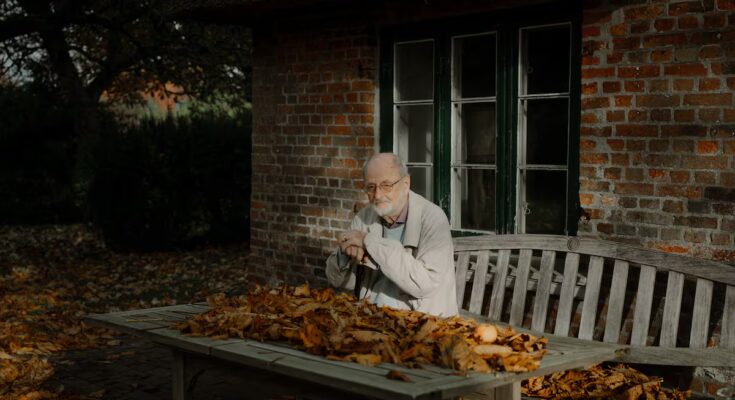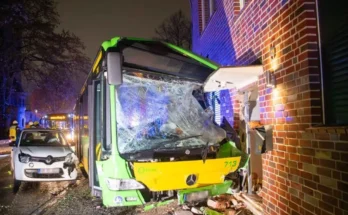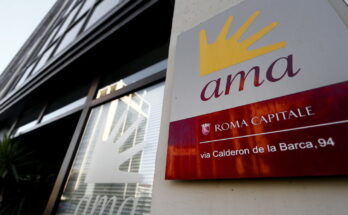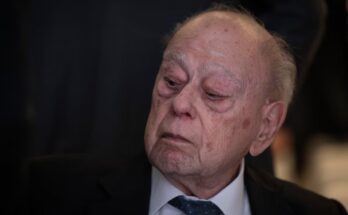Niklas Frank can’t get rid of his father, the Nazi criminal Hans Frank. He never will. He compares him to a goblin, an evil spirit that clung to his shoulders and wouldn’t let go. He will always have it with him.
“I hated my father,” he says, on a cloudy autumn morning, in his little house on the plain north of the Elbe, a place that seems to have come out of a fairy tale by the Brothers Grimm. “Now I despise it.”
Niklas was 6 years old when his father sat on the bench in Nuremberg. The trial began on November 20, 1945, 80 years ago today. Today he is 87 years old, he has been a widower for three years and, lighting one cigarette after another, he reels off memories and laments of this Germany and of this past that has never completely disappeared.
“It will never end,” he explains, “because the victims are still alive, burning in my brain.”
Niklas Frank was a prince of National Socialism. The youngest of Hitler’s leading lawyers and his viceroy in the territories between present-day Poland and Ukraine, where the Treblinka, Majdanek, Belzec and Sobibor extermination camps were located. The boy, the youngest of five brothers, grew up among the cotton fields of Krakow Castle where he came from Butcher from Poland He was preparing the murder of millions of Jews. He was 7 years old when Hans Frank died by hanging on October 16, 1946 along with the other Nazi leaders sentenced to capital punishment.
Niklas carried the famous photograph of his father’s body with him for years. “To make sure he’s dead,” he said. In the image, he is seen with a tag on his suit that says: “H. Frank.”
The son has repeated for years: “I am against the death penalty, except in the case of my father.” “I’m selfish,” he says now. “If my father had not been hanged, he would have wrecked my brain with his ideology. He was a fascinating guy. He spoke so well, he was so inspiring that he would surely have wrecked my brain and, surely, it would have taken me decades after his death to find the truth.”
Niklas Frank lives in Ecklak, a village of 300 inhabitants in the state of Schleswig-Holstein, north of Hamburg. Since the end of the 1970s he has worked for the weekly newspaper Sternfrom Hamburg. He was a journalist and columnist. As a child, in the Krakow ghetto or in the Nuremberg prison, where he visited his father a few weeks before his execution, he was already an observer. Hannelore, his wife, was a judge in the small town of Itzehoe.
Arriving at Ecklak by road from Itzehoe, the host advises visitors: “Go to the next garden before starting the interview.” Next to it, near the road that crosses the village, you can see a statue he designed: a crocodile with its skin painted in the black, red and yellow colors of the German flag, and a giant teardrop. A plaque reads: “The only honest monument to the Jewish children, women and men murdered by us (also valid for Austria)”.
“When it comes to German crimes,” says Niklas, “there is no one more chauvinistic than me. I don’t care about other countries with a lot of murders. No one has committed crimes like we committed in the Holocaust.”
Near the statue there is a small wooden building. On the door a sign indicates: “Entrance to Hell”.
The visitor hesitates, opens the door cautiously. Inside is a photo of Hans Frank with Adolf Hitler. There are photos of corpses in the extermination camps. There’s another one we’ve never seen and it causes a lot of discomfort. It is the corpse of Hans Frank. But not clothes, as in the famous photo of the executed in Nuremberg. He’s naked. Niklas Frank received this photo two years ago and believes it should be spread. It would be “personal revenge”, but he says no media wants to publish it.
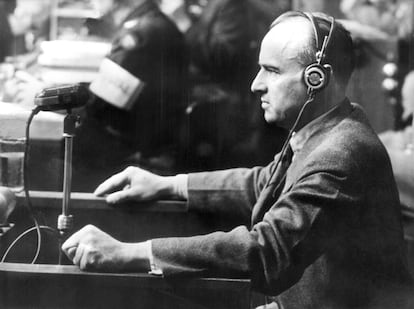
“Everyone can handle a lot of pictures of naked Jews, mountains of them,” he complains. “And you can’t stand the naked killer?”
Among the rare species of children of the great Nazis, Niklas Frank is a singular case, since in the 1980s he published the book Der Vater. Eine Abrechnung (“The father. The showdown”). The son of the Butcher of Poland confronts his father uncompromisingly, sometimes brutally. It is an extreme reflection – because the father’s crimes were extreme – of a society that in the 1960s embarked on a similar operation: that of holding parents and grandparents responsible for their crimes through actions or omissions. And accept that this heritage defines national identity. But few reached him, and not all of society shared his attitude, nor all the children of the Nazis. Another Germany said: yes, Nazism was criminal, but denied that his parents or grandparents could have participated in it.
in his book East-West Street (Anagrama, 2017), on the origins of international criminal law, the author, Philippe Sands, brought together these two Germanys in the persons of Niklas Frank and Horst Wächter, son of Otto von Wächter, another Nazi criminal who, unlike Frank, managed to escape from Nuremberg. While Frank accused his father, Wächter justified his father: “I know that the whole system was criminal and that he was part of the system, but I don’t think he was a criminal.”
The conversation with Niklas Frank begins in a small cabin near his house, where he uses to smoke. He smokes the same Camels that his mother, Brigitte Frank, nicknamed them Queen of Poland. On the wall of this room there is a drawing, made by one of his nephews, of The Lady with an Ermine. The same painting by Leonardo da Vinci that Hans Frank appropriated and hung on the walls of Wawel, the castle in Krakow.
Niklas recalls the few pleasant memories associated with his father, who called him shiver“strange” or “foreign”, because Hans suspected that Niklas’ biological father might be someone else: Karl Lasch, one of his subordinates, or Carl Schmitt, the eminent legal philosopher. This was the environment in which Hans Frank moved, Hitler’s lawyer in the 1920s, president of the German Academy of Law and Reich Minister without Portfolio, before being appointed governor general of occupied Poland.
“He is a criminal, but he became one because he was a coward and because he wanted to make a career,” says his son. “Besides, I was in love with Hitler.” He says he found no anti-Semitic references in his father’s youth diaries. He believes that if Hitler had ordered him to hate the Spanish, Hans Frank would have persecuted the Spanish or the French.
—And what is there of Hans Frank in you, your son?
-Cowardice. And, if necessary, I can lie perfectly. This is my father’s legacy. That said, I lied very little. I did this when I was having an affair with someone who wasn’t my wife.
He gets emotional when he remembers her. He recalls a scene from his terminal illness: “I was in the back of the house, drinking a beer and crying. Suddenly, Auschwitz, Auschwitz, Auschwitz appeared in my head. In a very strange way, this comforted me. Because we were able to live a long life and we were also able to experience a deadly disease like cancer.”
In his speeches in schools he asks young people to imagine that the Jews killed in the extermination camps are their loved ones. Let them visualize it. How they take them away from home, put them on trains, put them in gas chambers. He has done this exercise a thousand times. “How many times have I sent my wife, our daughter, our three grandchildren to the gas chamber!” he says. “Feel one millionth of the fear we inflict on millions of innocent people.”
He also tells young people: “Enjoy life, but remember that you are German. So you have to keep in mind what your grandparents, your great-grandparents did or saw them do and did nothing to prevent it. Please react immediately if you encounter people who speak in an inhumane way.”
Niklas stresses that these boys and girls “are not responsible” and “should not feel guilty”, but is wary of the Germans. He sees with alarm the increase in anti-Semitism and, in the statements of politicians, even moderate ones, on immigrants, a tone that reminds him of other times. Such as the electoral successes of the far-right Alternative for Germany party, which obtained 21% of the votes in the general elections in Ecklak.
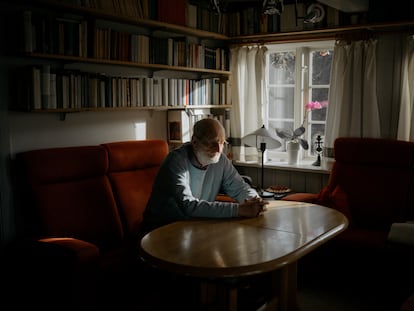
All of Germany’s efforts to address the crimes of the Nazi period, an exemplary effort for many, have another value for Hans Frank’s son. “We live in the best democracy we ever had, but it was built with Nazis.” He argues that, after World War II and the advent of democracy, “they obeyed the new system, just as they had obeyed the Third Reich.” “I assume there are only a million true democrats in Germany,” he says. “The others are ready to live in a dictatorship and love it.”
We leave the wooden hut and enter his house. He shows us a tiny room, his bedroom, where dark, twisted paintings he made as a teenager hang, featuring hanging men. in the living room He takes out a box with photos of the golden age, or the darkest one, when the Franks ruled in Krakow. There’s Hitler, there’s his father. Familiar presences, here neither remote nor exotic. “This is the queen of Poland, dressed in white, enjoying life,” he says, pointing to his mother Brigitte, who died in 1959, when he was 20. “They knew exactly what was happening in the camps.” “And this is me!” he says as he takes a photo where he must have been one year old. “Mr. Frank’s spoiled son.”
Later, in his old Mercedes, while taking visitors back to the station, he advises, almost at the end of this intense morning, not to trust the Germans.
—Are you included?
—Sometimes I don’t trust myself. When I start lying. Or when I’m a coward. This makes me furious.
